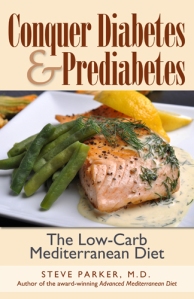Several years ago Prof. Roy Taylor and colleagues found they could apparently reverse type 2 diabetes with a very low-calorie diet. How low? 600–800 per day for eight weeks. His program—often called the Newcastle diet—has achieved some prominence in the United Kingdom but I don’t hear about it much over here across the pond. The clinical study in support of the program was very small—only 11 participants: 9 men and 2 women (with an average BMI of 33.6). I’m sure hundreds, if not thousands, have tried it since then.
I’m not endorsing or recommending the Newcastle diet at this time. I haven’t studied it in detail. It probably requires careful medical and dietitian supervision. Prof. Taylor says:
Our research subjects found the diet challenging to stick to. Motivated people were selected, and support from the team was given frequently. Support from the families of the research volunteers was very important in helping them comply with the diet. Hunger was not a particular problem after the first few days, but the complete change in social activities (not going to the pub, not joining in the family meals etc.) was a challenge over the eight weeks.
The purpose of this post is simply to collect a few informational links for my own records and for my readers who want to know more.
Links:
- Basic info about the plan from Prof. Taylor
- Information for physicians
- Recipes
- Seminal scientific report
- Prof. Taylor’s Banting Memorial Lecture on Reversing the Twin Cycles of Type 2 Diabetes
- My post on theoretical underpinnings of the Newcastle diet
The original program utilizes Optifast liquid meals (600 calories/day) plus vegetables for another 200 calories. Prof. Taylor notes that products equivalent to Optifast may be more readily available and just as effective, but I don’t know what those are. Ensure? Carnation Instant Breakfast? Boost? Jevity?
Very low calorie diets like this are often referred to as starvation diets or crash diets. Starvation diets can cause weakness and easy fatigue, headaches, dizziness, hair loss, gallstones, electrolyte (blood mineral) disturbances, palpitations, nutritional deficiencies, skin problems, gout, kidney failure, or worse.
Even if successful, transitioning away from the eight-week Newcastle diet better be done carefully or the diabetes will return.





Hi Steve
Last Saturday I wrote a post on my blog after reading in the Daily Mail about Dr. Michael Mosley’s 5:2 diet to reverse type two diabetes and his new book. On Saturday the diet discussed was and I quote “So I went on what I called the 5:2 diet (eat normally five days a week, then cut calories to around 600 on the other two days), and found it surprisingly manageable. I lost 20lb in 12 weeks and my blood sugar and cholesterol levels returned to normal”
I said regarding the 5:2 diet “Trust me, that will not work for most. Eating ‘normally’ is what got most people into the diabetes club in the first place, so that will never work. If I had continued to eat ‘normally’ for five days and starved myself for two days, after my diabetes diagnosis, I know I would have run dangerously high blood glucose numbers for five days of the week and seen a slight improvement in BG on the two days I starved. This would still apply to this day, if I had used the 5:2 diet”
Roll on to Tuesday in the Mail, and Michael is talking a totally different ball game, he is talking a strict low carb diet and 800 calories per day, every day for eight weeks. It is my opinion the average person does not have to go that low on the calorie count. I used around 1200 calories a day for my first 12 weeks of low carbing, using 30 grams of carb per day. When I reached the required weight and non diabetic blood glucose numbers, I returned to approximately 2500 calories per day. My weight has remained stable and seven years on, blood glucose numbers still non diabetic. Diabetes medication unchanged a 2 x 500 Metformin per day.
So, eating “normally” for five days a week appears to have gone out of the window, we are now talking strict low carb, probably less than my 50 carbs per day. But as with the Newcastle diet, what happens at the end of eight weeks? It is my opinion the participants will have to stay on a low carb diet permanently to maintain the excellent improvements most will make.
The question I am asking myself now is, why didn’t Michael say on Saturday a strict low carb diet is the way to go, and what was all the 5:2 malarkey all about. One other point, the meals look great, but I reckon many will struggle in today’s economic climate to afford some of the ingredients.
Link to today’s Mail article.
Best regards Eddie
Thanks for your contribution, Eddie.
Limiting calories to 800 a day for eight weeks will be impossible for many folks, and potentially dangerous.
Plus, 800 calories is likely low-carb, low-fat, AND low-protein.
This is basically a fasting diet. One could easily do this by skipping breakfast and lunch and eating a normal 500 to 600 cal dinner!
Nell, it sounds easy, but I seriously wonder how many could keep that up for eight weeks. I’m guessing no more than three out of 10 dieters. That calorie range is a starvation or crash diet.
My bad the link is http://www.dailymail.co.uk/health/article-3405676/Secrets-make-one-diet-stick-Eat-beat-diabetes-just-eight-weeks-s-life-changing-diet-help-avoid-reverse-Type-2-diabetes.html